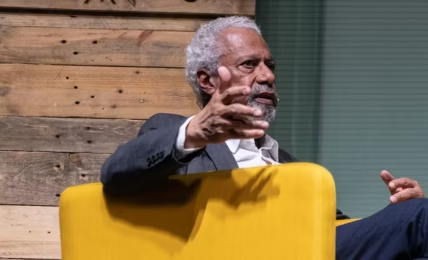When A Woman Becomes Water
You can't hear his voice when he cries, “When did this happen?!” It is the cry of a drowning man. But you can't hear; your waves are roaring.

You can't hear his voice when he cries, “When did this happen?!” It is the cry of a drowning man. But you can't hear; your waves are roaring.

When you wake up that morning, it is on the other side of your marriage. The underside. Where your husband is a faraway country. And it is winter there. You have to travel to him via questions, Are you fine? Are you happy? Do you want anything? Do you want anything more? You are tired when you arrive.
But he doesn’t let you in. Stops you at the gate with Yeses and Nos, and sounds in his throat.
You want to sit inside his house; find the room where he keeps his love. It is cold out here. But he shuts the door in your face with Let us pray.
He leads the prayers. As the head of the home. (You don’t know what part of the home you are. . . Are you even part of it? A real part. Or you’re just a prosthetic wife. . . Your mother used to say that a wife is the neck, supports the head. But she was treated like the ass — took all your father’s shit in that house. You had vowed not to be your mother. Your mother was a good wife. Not a good woman. A good woman doesn’t take shit; she gives it back to the owner.)
Your husband’s prayers are crawling all over your body. Ants. Biting you. Because your name is all over his prayers. He is saying your name as if you’re an outsider; as if you’re not part of him, the neck. As if you’re the ass, like your mother. Saying your name as if it tastes like shit in his mouth.
He prays that God makes Bidemi a good wife that follows the voice of her husband as the church, Christ’s Bride, follows the voice of God.
Bidemi laughs inside your stomach. A laugh that tastes bitter like sorrow when it comes up to your throat. He looks up. Doesn’t stop praying. Doesn’t stop weaving the stain of your name into the self-righteous fabric of his prayers.
He doesn’t ask you to pray. He prays all the prayers for the two of you. As the head. His mouth full of your name. In Jesus’ name.
Amen.
But you pray your own prayer. Inside the small place in your heart where there’s still a little light left; where a ray of belief still shines through that there is a God. The prayer is a small one — that God opens this man’s eyes to see you.
Amen.
*
“Is God a comedian to you?” he asks. He stops brushing his teeth, but doesn’t spit. You fear he’s going to swallow it.
You’re seated on the toilet, your body feeling light, as if you’re urinating all your problems into that bowl.
But this question has poured problems back into your heart.
“What?” you say.
“Or was it the devil that cracked a joke in your ear?” He still hasn’t spat this load out. He must have swallowed some. And he is not looking at you. He is looking at himself in the mirror.
“What joke?”
“The one that was funny during prayers,” he says to his reflection.
Oh! You remember. You hadn’t even laughed a full laugh; it was about an inch of a laugh, not enough to match the size of a real joke; only fitting something that was funny in a sad way. But he wouldn’t understand that.
“Nothing,” you say.
He doesn’t say anything. Continues brushing.
Rising from the toilet, you say to him in the mirror, “I’m resuming today.”
He doesn’t stop brushing, as if he didn’t hear.
Then when you’re about to ask him if he heard, he says, “What did you say?”
“I said I’m resuming today.”
“Resuming what?”
“Work.”
He spits for this one. “No you’re not,” he says.
“What?”
His mouth now empty, he says the words slowly, so that they reach you very clearly from the distant country that he has become.
“You are not going back to that job,” he says, looking straight into your eyes this time.
You’ve been shot. You don’t know what to say. You want to say something, but your mouth cannot hold all the things rushing about inside your head.
Only “What do you mean?” makes it out. In a tiny whisper that has tears on its edge.
“I mean what I said.”
What did he say? What is he saying? Does he even know what he is saying, or what he is saying means?
“That job is my. . .” (Calling it your life would be dramatic.) “It is my job,” you manage to say. Yes, it is. That is what it is — your job. How dare he think he can just take it from you like that, with just one sentence. No. No way.
“No,” you say, “It is my job.”
Your voice sounds as if it is travelling further and further away from you; as if you are speaking from a great distance, and it is somebody else speaking, somebody you don’t know, using your voice, to say words you don’t mean, words that are not strong enough to wrestle this man’s authority to the ground. . .
You try to gather all your strength back inside your throat so that he doesn’t think you’re crying or that you’re weak. Or that he has won. But he speaks before you can make any more words, and it is his final word on the subject, you can tell, the way he says it, his voice like a knife.
“This is your job now,” he says, pointing a wicked thumb at his chest.
He goes back to the mirror. Brushes, spits, rinses, and leaves.
Leaves you there inside the water your eyes are turning into. That is all you can see – water, water everywhere.
You are water.
You trickle into the bedroom, to form a pool at his feet, a pool of Please, please, I beg you. . . But he steps over the puddle of your grief on his way to the bathroom, and turns at the door, “Please get my breakfast ready.”
You gather your water up and pour everything, all of yourself, into becoming the good wife. Like your mother. She has won.
He has won.
A good wife lets her husband win. Makes him happy.
You make his breakfast. Make yourself disappear while he eats. Make the bed when he leaves. Make yourself small in the silence he leaves behind; small enough for you to hide all your sorrows in. And you become smaller and smaller every day, until he stops seeing you, or hearing your voice. You have grown so small that you have become silence.
Smallness is a prison. One day, locked in this cell you have built for yourself, you find a door in a book. You open it and step outside. The air is clean, the sky blue, the words are colours, they are alive.
There are more books. You keep opening all these doors and entering new places that feel like discovering different pieces of heaven hidden all over the place.
One day, one of these doors opens into a field lush with words of your own, watered by the bright colours of your imagination. It is like a spiritual experience when you find this power. Like a miracle, the way the words start to burst forth from the pipes of your mind.
You write the first story in a jotter you’d received as a souvenir from one of these weddings you had gone to with your husband, before your own wedding. Before you woke up on the wrong side of your marriage that morning and everything changed.
You pour all the water you’ve been carrying inside you into that first story, and it turns into flowing prose. You send it out to one of these fancy literary journals you found on the Internet, and the reaction is a flood when it comes. It drowns the Internet.
You are no longer just water; you have become an ocean! You can feel the power you have now, feel it inside your stomach, bubbling. The power of a water goddess whose words flow with the strength of a thousand waves. You let these waves carry you to greatness.
But you’re still small to your husband. He still doesn’t see you.
The day he sees your name on the cover of a book – your debut novel — he comes home and notices for the first time that you have grown into a continent, under his nose, and he can’t find his way around you.
You can’t hear his voice when he cries, “When did this happen?!”
It is the cry of a drowning man. But you can’t hear; your waves are roaring.
You remember your prayer, for your husband to see you. You are the god that answered your own prayer; turned yourself into an ocean, now he doesn’t just see you, you’re everywhere he turns. A mighty body of water.


